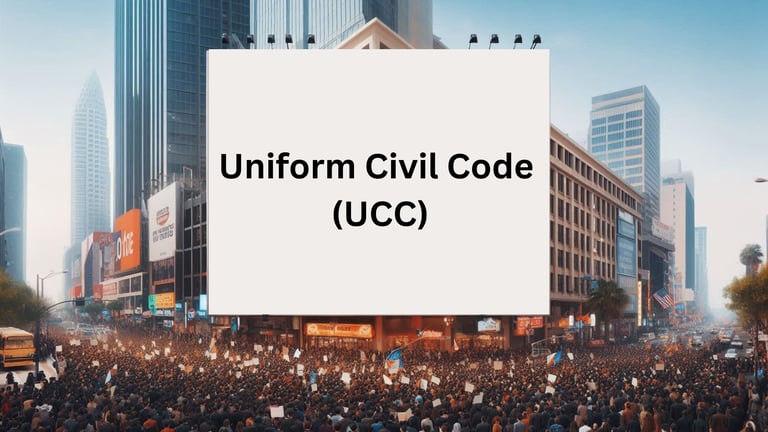Uniform Civil Code (UCC)
Anshveer Nath
Indian Institute of Management Rohtak
This blog is written by Anshveer Nath, a Third-Year law student of Indian Institute of Management Rohtak


The Uniform Civil Code (UCC) is defined under Article 44 of Part IV (Directive Principles of State Policy) of the Indian Constitution, which states that a uniform law should be enforced nationwide. Currently, Goa is the only state that has implemented a UCC, applying it regardless of caste, religion, or gender. This raises a significant question: Will people compromise for the greater good? India, with its eight major religions, has multiple personal laws that often conflict with one another.
For instance, in the Shah Bano case, the court held that she was entitled to three months of maintenance after 40 years of marriage. This decision conflicted with Section 125 of the Criminal Procedure Code (CrPC). Similarly, while Muslim personal law permits up to four marriages, Section 494 of the Indian Penal Code (IPC) strictly prohibits bigamy. Furthermore, underage marriage is permitted under some personal laws, despite scientific evidence showing it harms health. Implementing the UCC would eliminate such inconsistencies, treating all citizens equally under a single legal framework, promoting national unity, and reducing confusion about laws.
India’s current personal laws exhibit various disparities. For example, inheritance laws differ based on region and religion. Divorce laws also vary; under Muslim law, a husband can unilaterally divorce his wife, whereas other religions have different requirements. In Hindu law, adoption is recognized, but Muslim and Christian laws impose traditional restrictions. These disparities give certain religions legal advantages over others. The UCC, envisioned by the Constitution's founders, should have been implemented nationwide long ago. Leaders like Jawaharlal Nehru and Dr. B.R. Ambedkar have supported the UCC from the beginning.
Historically, even in Mesopotamia, the "Code of Ur-Nammu"—the oldest known law code—was enforced uniformly within a family. If a uniform set of rules could be applied then, there is no reason why India, with its advancements, cannot implement a UCC today. Countries like Jordan, Turkey, France, Germany, and Indonesia have adopted UCC-like systems. In Indonesia, for example, stricter conditions were placed on polygamy, and the legal marriage age was set at 19. These countries compromised for the greater good.
The steps to implement the UCC in India could begin with public consultations, followed by political proposals, and ultimately a debate in Parliament. However, opposition remains, particularly from Muslim communities who argue that the UCC infringes upon their freedom of religion guaranteed under Article 25 of the Constitution. Yet, the Constitution clearly states that this freedom is subject to considerations of public order, morality, and health. Critics claim that Hinduism has never changed, but Hindu laws have evolved significantly by banning practices like Sati, child marriage, polygamy, dowry, and others.
The Special Marriage Act, 1954, serves as an example of UCC principles, providing a secular framework for regulating marriages in India. The Supreme Court, through various rulings, has also advocated for the UCC. For instance, in Jose Paulo Coutinho vs. Maria Luiza Valentina Pereira & Anr. (2010), Justice Deepak Gupta highlighted the lack of progress despite previous court directives. Earlier cases like Mohd. Ahmed Khan vs. Shah Bano Begum and Sarla Mudgal vs. Union of India also emphasized the need for a UCC. In the Sarla Mudgal case, the Court questioned why a uniform code had not yet been implemented, given that a large portion of the population was already governed by a codified system of Hindu personal law.
References
1. https://www.iqballawservices.com/payment-of-dower-haq-e-mehr/
2. https://ppgsiitkgp.in/blog/ucc_blog
3. Dr. Bhagyashree A. Deshpande, ‘Need and Importance of Implementation of UCC in India’ (2020) Junikhyat Journal http://www.junikhyatjournal.in/no_5_may_20/11.pdf accessed 5th September 2024
4. Jhilike Saha and Prantik Basak, ‘Towards a Unified Legal Framework: Exploring the Case for a Uniform Civil Code in India’(2024) research gate https://www.researchgate.net/profile/Prantik-Basak/publication/380131286_Towards_a_Unified_Legal_Framework_Exploring_the_Case_for_a_Uniform_Civil_Code_in_India/links/662c992f35243041534f4210/Towards-a-Unified-Legal-Framework-Exploring-the-Case-for-a-Unifo accessed 4th September
5. Taniya Malik, ‘Unity in Diversity: Navigating the path towards UCC in India’ (2024) IRJMShttps://www.irjms.com/wpcontent/uploads/2024/04/Manuscript_IRJMS_0392_WS.pdf
